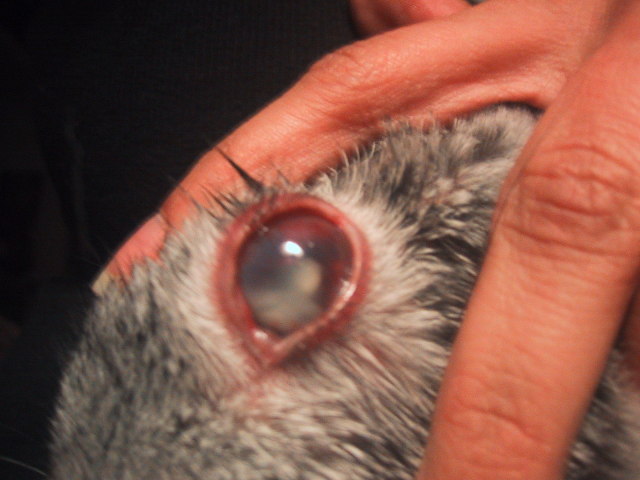QuestionQUESTION: Hi,
Per my previous questions from a few months back, we switched from our long time vet to a more rabbit-savvy vet, after our 5 year old bunny lost the use of his back legs. Under the guidance of the new vet, our bun was given an e. cuniculi test and it came back as a "high positive" result. Subsequently, he was prescribed Panacur (fenbendazole) for a 30 day period and during that time he has regained some of his mobility. At the moment, he gets around without too much trouble for the most part...just some days his legs are more splayed out and weaker than others. Anyway, we just had a follow-up e. cuniculi test (after being off the Panacur for a few weeks) and the results are essentially the same...a high positive result, which has us bummed out. At this point, the vet says we should continue with a pulse dose of Baytril for 30 days (mainly for his sneezing/runny nose problem, but the vet says this may also benefit his legs/e. cuniculi to a small degree). Basically, the vet says at this point, that it's not unusual to treat for e. cuniculi and not see the numbers go down and that we just need to monitor our little guy and treat any symptoms that might arise. I didn't get a chance to talk to the vet myself (my wife did over the phone), but she did ask if we should try another round of the Panacur, which the vet said was not a good idea at this time. I'm wondering if you have any advice at this point, like asking about trying Ponazuril at some point? Obviously, I realize that it's best to try and keep them off of strong medications, if possible, or at least being on strong stuff long term. Btw, at this point, he's tried the Panacur for 30 days and has been on a regular dose of Baytril for about 2 months and a week (he's been off Baytril for a few days, before we just put him back on it, as a pulse dose, instead of every day). Other than that, he takes Metacam every other day, which I think helps him somewhat. Just thought I would run the Ponazuril question by you and see what you thought, along with any other thoughts or words of encouragement you might have. As always, thanks so very much!
ANSWER: Dear Paul,
I'm glad to hear that your little guy is holding his own, and is still mobile. It's not unusual for a titer to stay high, even after treatment. Many vets and rabbit-savvy folks now think that the best the Panacur does is to suppress the parasite, and may not kill it outright. Ponazuril, on the other hand, is *supposed* to kill it. So it might be time to ask about that and see if you see any improvement.
I am NOT a big fan of "pulse dosing" and have no idea why they teach that in vet schools. It is a terrific way to breed resistant bacteria, since you're exposing the pathogens only intermittently to the antibiotic that's supposed to kill them. This will allow only the strongest, most resistant bugs to survive...and guess what happens next! :(
Is the vet concerned about long-term Panacur because of possible anemia problems? So far, this has been reported only in birds and anecdotally a few (unconvincing) times in a mammal or two. You might want to ask. The drug does have some toxicity, though, so maybe it's time to ask about ponazuril.
The good news about the high titer, though, is that your rabbit is mounting a strong immune response to the parasite, and that will help--not harm--the situation. I hope he continues to stay well! He's lucky to have such caring parents. :)
Take care,
Dana
---------- FOLLOW-UP ----------
QUESTION: Once again, thanks for the insightful answers, Dana!
I didn't speak directly with the vet myself about continuing with the Panacur (my wife did), but she said they just don't like to have rabbits on it long term and they didn't elaborate beyond that point. Sounds like it's at least time to ask about the Ponazuril. You would think they might have already suggested it, but perhaps it's so new that these particular vets just aren't completely familiar with it yet and/or haven't developed a stance on it's use and possible success. Either way, we will definitely ask about it.
Now, as far the pulse dosing goes, you make an excellent point. I'm just wondering if we should abandon this treatment immediately (he's on a M-W-F dose and has only had three doses, so far), or go back to a steady, every-day dose until his current prescription is used up. I just don't know if we should go ahead and take action ourselves or wait and try to talk about it with our vet first. I'm guessing most vets probably don't appreciate what might appear to them as "back-seat" doctoring from their patient's parents, when their methods are being questioned, even though the info is really coming from a Ph.D., who's an expert in the field! What would you do in this situation?
AnswerDear Paul,
Ah, the medical ego. It's a hard thing to deal with in any forum, but when your own baby's life is at stake, you have to be the advocate. It just has to be done delicately.
I think maybe you could ask the vet about the pulse dosing by saying you'd been reading about it and had learned that many veterinarians feel it's risky because of the very real possibility of selecting resistant bacteria. I'd like to hear the vet's response. My guess would be s/he might say, "Well, we can go back to daily dosing if you want."
If they *don't* give you that option, or just dismiss your educated question, then I'd definitely seek a new vet:
www.rabbit.org/vets
You can also ask them *why* they don't want to continue the Panacur. They owe you an explanation. They are not gods, and you are the paying client, so they should not hold back important information from you that will help you make informed choices.
If they don't know about Ponazuril...well, by now they should. But you could bring them product information from the 'net straight from Bayer and maybe try to educate them?
ARGH. So frustrating to deal with egos like that. NO ONE is always right, but I think there's a special course in veterinary and medical schools that teaches the students otherwise!
I hope that will help with some ideas. Just broach the subjects politely and firmly and hope for the best!
Good luck!
Dana

 Bloody eyes dwarf rabbit
Question
Jasmin1 Jasmin2
Hello, doctor,
I
Bloody eyes dwarf rabbit
Question
Jasmin1 Jasmin2
Hello, doctor,
I
 URGENT -- Rabbit has sudden loss of appetite. (still eating, details inside)
Question
Luna
My rabbit is not herself today. I let her
URGENT -- Rabbit has sudden loss of appetite. (still eating, details inside)
Question
Luna
My rabbit is not herself today. I let her
 gray ears
QuestionObama
QUESTION: Hi,
I have a lop-eared r
gray ears
QuestionObama
QUESTION: Hi,
I have a lop-eared r
 EXTREMELY concerning eye problem
QuestionTinkerbells Cloudy Ey
QUESTION: Dana,
M
EXTREMELY concerning eye problem
QuestionTinkerbells Cloudy Ey
QUESTION: Dana,
M
 Scab-ish growth on my rabbits ear?
Question
Rhino Right outer ear
Hello!
Ill
Scab-ish growth on my rabbits ear?
Question
Rhino Right outer ear
Hello!
Ill